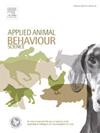Maned wolves (Chrysocyon brachyurus) differ in their responses to environmental enrichment: Why?
IF 2.2
2区 农林科学
Q1 AGRICULTURE, DAIRY & ANIMAL SCIENCE
引用次数: 0
Abstract
The maned wolf, a species vulnerable to extinction, is widely found in zoos. Environmental enrichment techniques have been recommended to increase environmental unpredictability, therefore stimulating behavioral diversity, and promoting welfare for zoo animals. However, diverse responses to unpredictability have been recorded in maned wolves, including increases in stress hormones, for unknown reasons. We aimed in this study to identify possible factors associated with the responses of maned wolves to enrichment. We tested the influence of temperament, sex, origin, rearing, and age on behavioral and hormonal responses of 13 captive maned wolves to feeding enrichment. Hormonal (fecal glucocorticoid metabolites – GCM - evaluation) and behavioral (by focal sampling and interval recording methods) data were gathered. We ran eight 5-minute sessions per animal per day, in three different stages: Baseline I, Enrichment, and Baseline II, 10-day long each. Temperament tests were also applied. Temperament, Sex, Environmental Enrichment, Age, and Origin were all factors influencing the behaviors of the maned wolves. Cautious females exhibited a tendency for greater locomotor activity than exploratory females, while GCM of both remained stable throughout experiment. The males had a reduction in GCM levels during the Environmental Enrichment stage and exhibited greater frequencies of Rest and Affiliative behavior than females. Younger animals exhibited higher frequencies of Locomotion, Foraging, and Affiliative behavior, and wild-born animals foraged more than captive-born wolves. As a whole, environmental enrichment had a potentially beneficial impact on the behaviors of males and females, resulting in a reduction of the time they were inactive and hiding. Our findings highlight the relevance of considering the specific needs of each sex and individual when planning environmental enrichment interventions for maned wolves. Such a procedure has the potential to improve the welfare of the individuals, by promoting environmental complexity and reducing stress responses, thus contributing to the ex-situ conservation of the species.
鬃狼(Chrysocyon brachyurus)对环境富集的反应各不相同:为什么?
鬃狼是一种濒临灭绝的物种,广泛存在于动物园中。人们建议采用丰富环境技术来增加环境的不可预测性,从而刺激行为多样性,提高动物园动物的福利。然而,鬃狼对不可预知性的反应却多种多样,包括应激激素的增加,原因不明。在这项研究中,我们旨在确定与鬃狼对强化训练的反应有关的可能因素。我们测试了性情、性别、原产地、饲养方式和年龄对 13 只人工饲养的鬃狼对强化喂养的行为和荷尔蒙反应的影响。我们收集了荷尔蒙(粪便糖皮质激素代谢物 - GCM - 评估)和行为(焦点取样和间隔记录方法)数据。我们在三个不同阶段对每只动物每天进行八次 5 分钟的训练:基线 I、强化和基线 II,每个阶段为期 10 天。我们还进行了性情测试。性情、性别、丰富环境、年龄和出身都是影响鬃狼行为的因素。谨慎的雌性比探索的雌性表现出更大的运动活动倾向,而两者的 GCM 在整个实验过程中保持稳定。在环境强化阶段,雄性鬃狼的 GCM 水平有所下降,并且休息和亲近行为的频率高于雌性鬃狼。年龄较小的动物表现出更高的运动、觅食和亲和行为频率,野生出生的动物比圈养出生的狼觅食更多。总体而言,环境富集对雄性和雌性狼的行为有潜在的有益影响,减少了它们不活动和躲藏的时间。我们的研究结果突出表明,在为鬃狼规划环境富集干预措施时,应考虑不同性别和个体的具体需求。这种程序有可能通过提高环境复杂性和减少应激反应来改善鬃狼个体的福利,从而有助于该物种的就地保护。
本文章由计算机程序翻译,如有差异,请以英文原文为准。
求助全文
约1分钟内获得全文
求助全文
来源期刊

Applied Animal Behaviour Science
农林科学-行为科学
CiteScore
4.40
自引率
21.70%
发文量
191
审稿时长
18.1 weeks
期刊介绍:
This journal publishes relevant information on the behaviour of domesticated and utilized animals.
Topics covered include:
-Behaviour of farm, zoo and laboratory animals in relation to animal management and welfare
-Behaviour of companion animals in relation to behavioural problems, for example, in relation to the training of dogs for different purposes, in relation to behavioural problems
-Studies of the behaviour of wild animals when these studies are relevant from an applied perspective, for example in relation to wildlife management, pest management or nature conservation
-Methodological studies within relevant fields
The principal subjects are farm, companion and laboratory animals, including, of course, poultry. The journal also deals with the following animal subjects:
-Those involved in any farming system, e.g. deer, rabbits and fur-bearing animals
-Those in ANY form of confinement, e.g. zoos, safari parks and other forms of display
-Feral animals, and any animal species which impinge on farming operations, e.g. as causes of loss or damage
-Species used for hunting, recreation etc. may also be considered as acceptable subjects in some instances
-Laboratory animals, if the material relates to their behavioural requirements
 求助内容:
求助内容: 应助结果提醒方式:
应助结果提醒方式:


